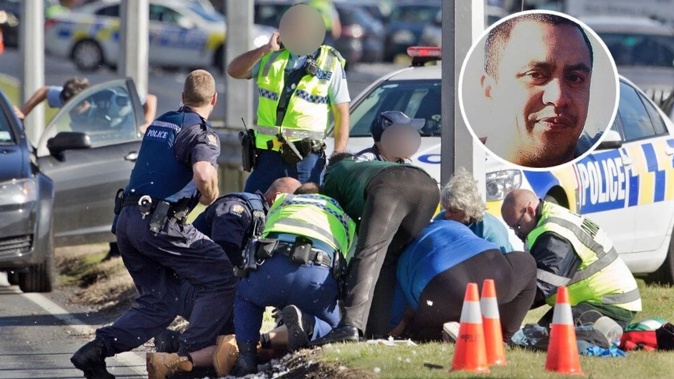

A man armed with a slasher and wrench who was being chased by police wasn’t trying to hurt anyone in the seconds before he was shot twice in the stomach by a probationary officer.
Coroner Mike Robb has found that Shargin Atarea Stephens had been trying to get away from police and only made a step towards the armed probationary officer after being surrounded by a dozen police officers in a Rotorua street in 2016.
“He did not charge towards or try and swing the slasher to hit any officer.
“Despite his animosity towards the police, he was not seeking to physically engage with any officer.”
The shooting happened within five minutes of an officer first lodging a 10-10 priority call saying Stephens had smashed up a patrol car.
The 35-year-old died of his injuries two weeks later in hospital.
In findings released today the coroner said the actions of the probationary officer, the most junior at the scene, contributed to Stephens’ death by rushing towards him, which escalated the situation.
He added that the death was “preventable,” and he listed 30 recommendations for the police.
They included the wearing of body cameras, probationary officers not taking control of situations where senior staff are present, the proper use of M4 rifles, de-escalation training, use of police dogs, reviewing the police risk assessment process, reviewing bail checks and training in emergency code calls.
Coroner Robb said he had received just one response from police regarding his recommendations, which related to their use of body cameras.
He also directed that his findings be referred to the IPCA and police, but what, if any steps, they considered thereafter was a “matter wholly at their discretion”.
Coroner Robb also found the officer, a recent graduate or “probationary officer”, to be an inaccurate or unreliable witness, and was scathing of the evidence given by several other senior officers who were at the scene that day, including an AOS staffer.
“Without the benefit of CCTV footage, video footage taken by members of the public, it is highly likely the determinations that I have made in this inquiry would have been quite different if based solely on officers’ accounts,” he said.
‘The shooting’
Stephens was on electronically-monitored bail, got a variation to allow him to work.
By July 14, he had been on bail for 38 days without any breach, yet police had checked him 70 times, which included waking him up “on numerous occasions”.
Despite that, the coroner said Stephens was “polite and compliant but significantly frustrated by the police actions” and felt they were playing games with him.
The day before his death, he consumed 0.1g of meth, before sharing another two 0.1g with his partner that night.
 Police surround Shargin Stephens. Photo / Supplied
Police surround Shargin Stephens. Photo / Supplied
The morning of his death, his partner didn’t consider him greatly affected by the meth, apart from having limited sleep.
He was agitated after having a confrontation with an associate about work, and then ripped off his electronically monitored bracelet before noticing a patrol car drive past his Vaughan Rd home.
Stephens threw a gym weight at the car before walking up to it and smashing it multiple times with a slasher.
The officer who had been driving the car called in a 10-10 coded emergency about 12.45pm, and Stephens was chased from Vaughan Rd through a mechanics workshop on Marino Rd to Te Ngae Rd.
By that point, one officer had tasered him twice, including once in the face, another pepper-sprayed him, and another was prepared to hit Stephens with his patrol car.
Despite that, he continued to try to evade officers, who by this point numbered 12, along with three police dogs.
Stephens made his way over the first two lanes of Te Ngae Rd and was surrounded by police in the middle of the road.
As the officers surrounded him, the probationary officer had been sprinting to catch up with Stephens.
The officer then walked through the group as he pointed his rifle at Stephens, getting within 6 to 7 metres.
Taser audio captured the words “put it down” being yelled over a matter of seconds.
As an officer yelled, “put it down, you idiot”, and as Stephens made a slight movement towards the officer, he was shot.
 Emergency services help Shargin Stephens after he was shot by a police officer in Rotorua on July 14, 2016.
Emergency services help Shargin Stephens after he was shot by a police officer in Rotorua on July 14, 2016.
The coroner noted that multiple officers yelling at the same time “had little if any prospect of bringing about engagement with Mr Stephens”.
‘It was possible he could have survived’
In his findings, numbering 209 pages, Coroner Robb agreed with a whānau submission that had Stephens only been shot once, there was a possibility his chances of survival would have increased.
The coroner lambasted numerous officers for their actions, or lack of, and poor recall of events that happened right in front of them.
“There was no need for the officer who shot Mr Stephens to advance on Mr Stephens as close as he did, and in the manner he did.
“He positioned himself unnecessarily and dangerously close to Mr Stephens ... [and] led to, rather than prevented, Mr Stephens reacting.
“The actions of the officer accelerated, rather than ...de-escalated the incident.”
He said there was also a failure by senior officers to stop the probationary officer from taking charge of the police response.
 Police on Te Ngae Rd after the shooting of Shargin Stephens in 2016. Photo / File
Police on Te Ngae Rd after the shooting of Shargin Stephens in 2016. Photo / File
He agreed with an earlier IPCA conclusion that the police’s incessant bail checking of Stephens was “oppressive”.
‘He never intended to harm anyone’
The coroner found that Stephens never intended to inflict physical harm on anyone when he left his property that day, “or thereafter”.
His actions, holding the slasher above his head before he was shot, were to “keep officers away from him”.
The only time his actions “could have” been interpreted as “attempting to strike” was when he stepped toward the probationary officer, after he had advanced within six to seven metres.
Coroner Robb found Stephens was “not under the influence of methamphetamine or suffering from any kind of methamphetamine induced psychotic episode” at the time he was shot.
After his interaction with his work colleague that morning, he was already feeling agitated, and agitated “spontaneously” when the police car drove past on Vaughan Rd.
Shargin Atarea Stephens was 35 when he died after being shot by police.
“What was happening ...was likely a combination of sleep deprivation ... frustration, and anger at not being taken to work, frustration and anger at police in part due to the number and manner of their bail checks on him.”
His taking of the slasher and wrench was “unusual behaviour”, and he also had a knife in his pocket, but never presented it, and it was only discovered after he’d been shot.
“His behaviour was consistent with angry defiance rather than physical assault.”
However, the coroner added that he was behaving aggressively, which required a police response.
‘I find his evidence troubling’
The coroner took issue with a lot of the evidence given by attending officers, including a trained AOS officer, who couldn’t recall the probationary officer moving around in front of him while armed with the rifle at the Birchall and Maunder workshop.
“As a trained and senior AOS officer, being unaware of this probationary officer being in front of him with the rifle and consequently the potential dangers when this was occurring in a business premises ... in his capacity, and with his experience, I find that troubling.”
He also noted that none of the 12 officers felt that being armed with an M4 rifle was appropriate for the situation.
As for why the probationary officer took it upon himself to grab the rifle, then effectively take charge, and rush in front of all the other officers on Te Ngae Rd was because he “got himself into an overly elevated state”.
Coroner Robb said that despite the myriad of issues borne out of the second phase of the inquest, police held their original position that there was “essentially nothing that the police had done on the day that could be faulted or ought to have been done differently”.
‘Accountability and human dignity’
In a statement, Stephens’ whānau said they wanted thank the coroners and legal team involved in the process, saying the inquest gave voice to “the human story behind the headlines”.
They also wanted to acknowledge the probationary officer.
“We are now enmeshed as two peoples, forever connected by the loss of two lives: one lost in innocence, the other in death. We hope your path to healing becomes gentler, and that this tragedy may serve as a threshold toward a future filled with possibility and healthy growth.”
Stephen’s whānau said they wanted “accountability and human dignity” in police conduct across all avenues of their work.
“We trust that with those pillars to tether to, the tragedy that unfolded for us - and for all the police involved - will serve and assist as a template for true change.”
Read the whānau’s full statement here:
‘Shooting people is an absolute last resort’
Bay of Plenty District Commander Superintendent Tim Anderson said Stephens was shot after he threatened officers and members of the public.
He said the death has been investigated by police and twice by the IPCA, which found the officer involved was legally justified in shooting Stephens in self-defence to protect both himself and members of the public.
Anderson said police acknowledged the coroner’s findings and recommendations regarding police policy, practice, and training.
“Police will consider these recommendations but notes that many of the changes recommended had already been implemented following two IPCA reports and internal reviews of the incident over the last nine years.
“There has been significant scrutiny of this event over a period of nearly 10 years, and we will always take any opportunity to improve how we respond, to keep people safe.”
Anderson said these kinds of events have a profound effect not only on families, but also police.
“Shooting people is an absolute last resort decision that our staff constantly hope they never have to make. I want to commend the professionalism of our staff who responded to this incident.”
He said police officers are committed to protecting life and upholding the law.
“When an officer uses force to protect themselves or others, it is a tactical decision made after risk assessing the threat, the exposure to harm being faced, the necessity to act, and the best response considering all those factors.”
Belinda Feek is an Open Justice reporter based in Waikato. She has worked at NZME for 10 years and has been a journalist for 21.

Take your Radio, Podcasts and Music with you









